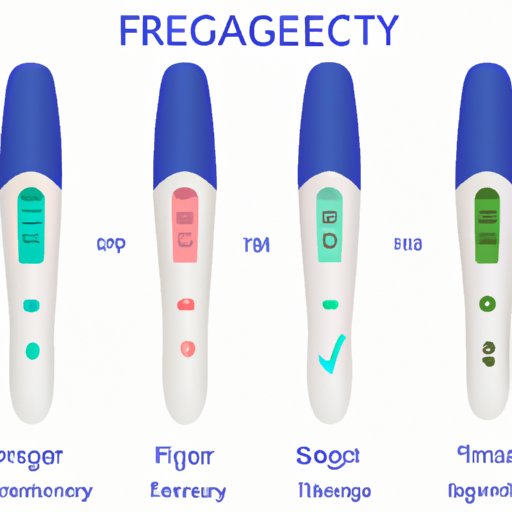
Introduction
For many women hoping to conceive, taking a pregnancy test can be nerve-wracking but exciting at the same time. Knowing when to take a pregnancy test is crucial because it can affect the accuracy of the results. This article will provide comprehensive information on when women can take a pregnancy test and what to consider before doing so.
When to Take a Pregnancy Test: A Comprehensive Guide
Before taking a pregnancy test, it’s essential to understand how they work to ensure that you choose the right one. Pregnancy tests use a hormone called human chorionic gonadotropin (hCG) to detect pregnancy. It is produced by the cells that form the placenta, which nourishes the fertilized egg after it implants in the uterus. Understanding the factors that affect test timing, such as ovulation and menstrual cycle length, is also crucial in determining when to take a pregnancy test.
For most women, taking a pregnancy test one week after a missed period will yield accurate results. However, if you have irregular menstrual cycles or are unsure of when your last period was, calculating when to take the test can be tricky. In such cases, you can use ovulation kits or fertility tracking apps to help predict your ovulation and fertile days.
5 Signs that It’s Time to Take a Pregnancy Test
Physical and emotional symptoms can vary from woman to woman when it comes to pregnancy. However, some common symptoms include missed periods, swollen and tender breasts, fatigue, nausea, and frequent urination. Experiencing these symptoms can suggest pregnancy, but they do not always indicate pregnancy. Some women do not experience any symptoms during the early stages of pregnancy. Before taking a pregnancy test, it’s essential to ensure that you have missed your period or are past the expected start date. If you have missed your period and are experiencing any of these symptoms, now may be the time to take a test.
The Do’s and Don’ts of Pregnancy Testing
When taking a pregnancy test, it’s crucial to read and follow the instructions carefully to ensure that you take the test accurately and interpret the results correctly. Some factors can affect test accuracy, such as medications, timing, and expired tests. It’s generally better to take a test early in the morning because the concentration of hCG is highest in the first urine of the day. After taking the test, wait for the recommended amount of time before reading the results. If the test is positive, it’s essential to schedule an appointment with a healthcare provider to confirm the pregnancy and determine the next steps. If the test is negative, but you are still experiencing concerning symptoms, speak with your healthcare provider to discuss further options.
When Should You Take a Pregnancy Test After IVF?
After undergoing in vitro fertilization (IVF), it can be nerve-wracking to determine the appropriate time to take a pregnancy test. During IVF, fertility experts usually schedule embryo transfers based on the day of egg retrieval. Thus, the timing of pregnancy testing after IVF can differ from that of natural pregnancy. Typically, fertility experts advise waiting at least 10 to 12 days after the egg retrieval process before taking a pregnancy test.
The Best Pregnancy Tests to Use and When to Use Them
Various types of pregnancy tests are available in the market, including digital tests, early detection tests, and standard paper strip tests. Early detection tests such as First Response or Clear Blue can detect a pregnancy hormone as soon as six days before a missed period. Standard paper strip tests are affordable and readily available but require more extended periods after a missed period to provide an accurate result. Digital tests display a message that says ‘Pregnant’ or ‘Not Pregnant’ and are easy to read. Choosing the right test depends on your personal preference and the reliability and accuracy of the test. It’s essential to read reviews and testimonials about the tests before purchasing them.
Conclusion
Taking a pregnancy test can be exciting but nerve-wracking, but knowing when to take it can affect its accuracy. Women must understand how pregnancy tests work, familiarize themselves with the symptoms that suggest pregnancy, and choose the right test to ensure accurate results. With the information provided in this article, women can make informed decisions about when to take pregnancy tests and maximize their chances of achieving their family planning goals.




